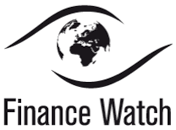Rein in the rating agencies, says Jürgen Klute
As financial crisis takes its toll on the European Union economies, MEPs are turning their eyes to credit rating agencies. With their ratings closely watched by investors, the agencies' verdict on the soundness of governments' finances can raise the costs of borrowing for a country to unsustainable levels, as the Greek case has shown. We contacted German MEP Jürgen Klute of the leftist GUE/NGL bloc who is one of the five MEPs that will be putting questions on the role of rating agencies to the European Commission on Tuesday.
What is your view on the role credit rating agencies played in the run-up to the financial crisis, especially when rating financial instruments linked to mortgages and real estate market? Has there been a conflict of interest, with agencies being paid by the firms that sold these financial products to investors?
Credit rating agencies failed in the crises of the 1990s, they failed again in the Enron case at the start of the new millennium, they provided incorrect assessments of financial products based on US mortgages in 2007 and they kept on giving Lehman Brothers high ratings, although the investment bank was already teetering.
The big three rating agencies, Standard & Poor’s, Moody’s and Fitch, are private listed companies. They are granted the role of a referee when, at the same time, they are also players in the financial playing field, aiming for the highest possible returns. Currently, companies that issue securities pay for the rating of stocks, bonds and other financial products they want to sell to investors. Making investors, not issuers, pay for several, more objective ratings would bring a minimum of fairness into the match.
In recent weeks we have seen how rating agencies can make the costs of borrowing rise for whole economies when they downgrade particular countries. Given their track record, do you think that credit rating agencies should wield such influence?
States must not be mistaken for companies. They organize and decide about the way societies live together. In the current Eurozone crisis, however, it is not about agencies mixing up states and companies; it seems to me that they are creating false panic based on their views about an otherwise implausible default of the Southern EU States and encouraging speculation. Very high interest rates for Greece might serve the recapitalization of international banks, but agencies are finally gambling their credibility away. Today, the rating business is far away from assessing risk, it is rather creating risk.
What should in your opinion be done to make rating business in Europe more in line with what the economy really needs?
Even European Commission finally agrees that we urgently need public oversight, making rating agencies stand to new, firm rules. The power that private rating agencies exercise over public life has been abused, now we must limit this power.
Yet, I doubt that this will be enough. After the privatization of formerly public banks, the constitutive problem for most European countries is their dependence on financial markets. European Central Bank (ECB) needs to re-assess its policies and learn from its neighbours. Making a rating of a particular quality a condition for purchasing Eurozone government bonds has conferred to agencies an official role they do not deserve. Second, and equally important, we need euro bonds which would create an environment where speculation against Eurozone members would be less feasible.
You can also read the interview here!


